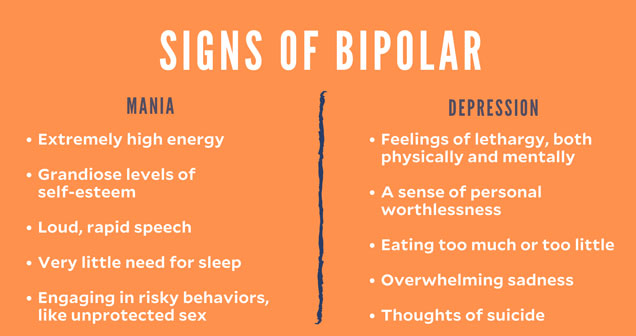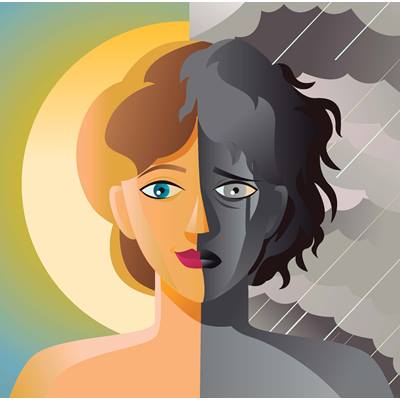Have you been struggling with daily activities? Do you have days where you feel like you can conquer the world only to be thrust into a pit of depression the following day? If you answered yes, then you might have bipolar disorder. Bipolar disorder can be described as a mental illness that causes a person to go through multiple “highs” and “lows” throughout the week. The highs are commonly referred to as periods of mania. These periods consist of the affected party feeling overly confident and energetic. Those experiencing highs can also become irritable, impulsive, and reckless. Some describe it as the feeling that you can take on the entire world and do anything you want to. The lows are periods in which patients present symptoms very similar to clinical depression. They might become sad, sluggish, and hopeless. If left untreated, bipolar disorder can greatly affect a person’s life and personal relationships.
TYPES OF BIPOLAR DISORDER
Bipolar I Disorder
Those experiencing bipolar I disorder normally experience the highest of highs and the lowest of lows. Their highs and lows can last for weeks and can even lead to them being hospitalized. They might experience hallucinations, delusions, or paranoia.
Bipolar II Disorder
Patients with bipolar II disorder experience the same symptoms as bipolar I, but their symptoms are not as extreme.
Cyclothymic Disorder
Patients with cyclothymic disorder have had periods of manic and depressive behavior for two years (one year for children and teens). However, the periods of mania and depression are not as severe as Bipolar I or II.

SYMPTOMS OF BIPOLAR DISORDER
For those with bipolar disorder, their periods of highs and lows do not follow a set schedule. They could be doing perfectly fine one day and then be extremely depressed the next day. Look for signs of both highs and lows, each with its own set of symptoms. Below are more examples of symptoms that accompany a bipolar diagnosis.
Symptoms Presented in Mania
There are two forms of mania: mania and hypomania. Mania is worse than hypomania and will cause the most noticeable changes in the patient’s life. People going through a period of mania or hypomania might exhibit these symptoms.
Abnormal amount of energy
During a high, a person with bipolar disorder will have an increased amount of energy out of nowhere. They might accomplish an abnormal amount of chores or projects. Some might begin an unrealistic and time- consuming task such as organizing the kitchen or pruning all of the shrubs.
High sex drive
The person might have an increased interest in sex or sexual activities. They will be more sexual than usual and will also be unusually open to others about their sex life.
Changes in eating habits
They might be so focused on projects that they forget to eat, or they refuse to eat. Either way, they believe that they don’t need food or water to continue their day.
Recklessness and poor decision making
They might make poor decisions such as partaking in drugs or partying and can also become irresponsible with money. They might go on a shopping spree or buy items that are of no use to them.
Excessive optimism and excitement
They make large and unrealistic plans for the present and future. They also have an elevated sense of self- worth and confidence.
Changes in speech
They might talk more than usual and faster than usual. They might also lose their “filter” and begin saying things that are inappropriate or offensive.
Changes in sleep
Those experiencing a high have a belief that they do not require sleep to keep functioning. They will either be unable to sleep or will outright refuse to sleep.
Psychosis
Sometimes highs can cause a break from reality, causing the patient to have hallucinations and delusions. Patients experiencing psychosis are commonly hospitalized to be treated and monitored.
SYMPTOMS EXHIBITED DURING A DEPRESSIVE EPISODE
Lack of energy
They might not engage in their usual schedule and activities.
Increase in sleep
They might sleep in and take multiple naps throughout the day. Their movements and speech might become sluggish.
Insomnia
They might not be able to fall or stay asleep.
Excessive sense of hopelessness and guilt
Patients might begin to blame themselves for past or present situations.
Feelings of self-hatred
Patients might experience intense self-hatred and judge themselves harsher than usual.
Suicidal thoughts or tendencies
Those experiencing a depressive episode might have thoughts of suicide or self-harm.

DIAGNOSIS AND TREATMENT
If you or a loved one are experiencing symptoms of bipolar disorder, it is vital to see a mental health specialist as soon as possible. They can give an official diagnosis and create a treatment plan. Self- diagnosing yourself is dangerous and can lead to a misdiagnosis and lack of proper treatment. Seek emergency help if you or a loved one are experiencing psychosis or suicidal thoughts.
Bipolar disorder cannot be fully cured, but there are options to treat it. The most common treatment is medication and can include anti-depressants, mood stabilizers, antipsychotics, and anti-anxiety medications. Each case is different so it might take time to figure out the right combination of medication for the patient.
Another treatment option, commonly used alongside medications, is psychotherapy. Psychotherapy can help alter habits and promote consistent schedules. It can also provide a deeper understanding of the bipolar disorder and how to handle it. It will give the patient and their family the knowledge to anticipate and assist manic or depressive episodes.
Any form of mental illness can be scary and confusing to those who have never experienced it before. If left untreated, mental illnesses like bipolar disorder can cause long-term damage to your health and personal relationships. If you or a loved one are showing signs of bipolar disorder, it is essential to talk to a professional as soon as possible. A professional can correctly diagnose you and create a special treatment plan to get you on the road to recovery.
If you or anyone you know is suffering from Bipolar Disorder, our expert providers at Specialty Care Clinics will take care of your health and help you recover.
Call 469-545-9983 to book an telehealth appointment for an at home check-up.
